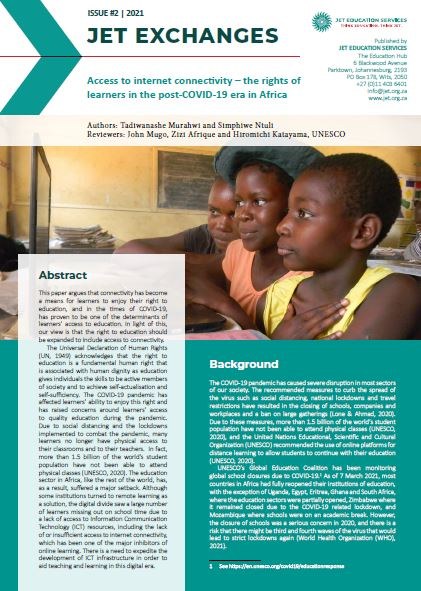
JET Exchanges 2/2021: Access to internet connectivity
Our second JET Exchanges learning brief focuses on access to internet connectivity – the rights of learners in the post-COVID-19 era in Africa
Authors: Tadiwanashe Murahwi and Simphiwe Ntuli
Reviewers: John Mugo, Zizi Afrique and Hiromichi Katayama, UNESCO
This paper argues that connectivity has become a means for learners to enjoy their right to education, and in the times of COVID-19, has proven to be one of the determinants of learners’ access to education. In light of this, our view is that the right to education should be expanded to include access to connectivity.
The Universal Declaration of Human Rights (UN, 1949) acknowledges that the right to education is a fundamental human right that is associated with human dignity as education gives individuals the skills to be active members of society and to achieve self-actualisation and self-sufficiency. The COVID-19 pandemic has affected learners’ ability to enjoy this right and has raised concerns around learners’ access to quality education during the pandemic.
Due to social distancing and the lockdowns implemented to combat the pandemic, many learners no longer have physical access to their classrooms and to their teachers. In fact, more than 1.5 billion of the world’s student population have not been able to attend physical classes (UNESCO, 2020). The education sector in Africa, like the rest of the world, has, as a result, suffered a major setback. Although some institutions turned to remote learning as a solution, the digital divide saw a large number of learners missing out on school time due to a lack of access to Information Communication Technology (ICT) resources, including the lack of or insufficient access to internet connectivity, which has been one of the major inhibitors of online learning. There is a need to expedite the development of ICT infrastructure in order to aid teaching and learning in this digital era.
We invite all stakeholders interested in this project to engage with the concepts and content of the paper, and we welcome any further engagement on this topic. Download the JET Exchanges 2/2021